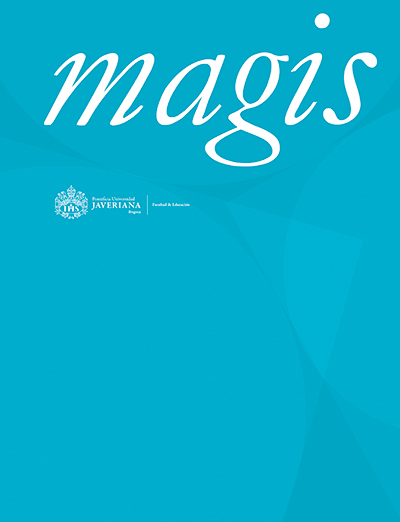Resumen
Este artículo explora el concepto de aprendizaje como espacio de intercambio y conexión entre signos, acontecimientos y cuerpos inspirado por la filosofía de la diferencia de Gilles Deleuze. Esta metodología cualitativa se basa en el Rizoma con sus características o principios de heterogeneidad, multiplicidad y a-significación, entre otras cosas. Permite una conversación productiva con estudios de entornos de aprendizaje y de producción de sentido a través de imágenes y sonidos provenientes de medios cinematográficos, tales como el del nadador y la natación. Se enfoca en el aprendizaje, su entorno y su papel en la relación entre mente y mundo.
Bellour, R. & Hardyck, A. (2012). Raymond Bellour: between-the-Images. Zurich: JRP/Ringier.
Bennett, J. (2010). Vibrant Matter: A Political Ecology of Things. Duke and London: Duke University Press.
Bhaskar, R. (1998). General Introduction. In M. Archer, R. Bhaskar, A. Collier, T. Lawson & A. Norrie (eds.). Critical Realism: Essential Readings, ix-xxiv, London: Routledge.
Bogue, R. (2008). Search, Swim and See. In I. Semetsky (ed.). Nomadic Education - Variations on a Theme by Deleuze and Guattari, 1-16. Rotterdam: Sense Publishers.
Brandom, R. (1994). Making it Explicit: Reasoning, Representing, and Discursive Commitment. Cambridge, Massachusetts: Harvard University Press.
Brandom, R. (2000). Articulating Reasons: An Introduction to Inferentialism. Cambridge, Massachusetts: Harvard University Press.
Brandom, R. (2004). The Pragmatist Enlightenment (and its Problematic Semantics), European Journal of Philosophy 12(1), 1-16. https://doi.org/10.1111/j.0966-8373.2004.00196.x
Buchanan, I. M. (2017). Assemblage Theory, or, the Future of an Illusion. Deleuze Studies, 11 (3), 457-474. http://dx.doi.org/10.3366/dls.2017.0276
Colman, F. J. (2010). Rhizome. In A. Parr (eds.). The Deleuze Dictionary, 232-235. Edinburgh: Edinburgh University Press.
Deleuze, G. (1968). Différence et repetition (Paris, Presses Universitaires de France, PUF). Difference and Repetition. Paul Patton (transl.). New York: Columbia University Press.
Deleuze, G. (1993). The Fold: Leibniz and the Baroque. Tom Conley (trans.). Minneapolis: University of Minnesota Press.
Deleuze, G. (2006). Nietzsche and Philosophy. Michael Hardt (trans.). New York: Columbia University Press, European Perspectives Series.
Deleuze, G. & Guattari, F. (1980). Mille Plateaux. (Paris: Minuit). A Thousand Plateaus, by Brian Massumi (trans.). Minneapolis: University of Minnesota Press.
Fodor, J. & Lepore, E. (2007). Brandom Beleaguered. Philosophy and Phenomenological Research, 74 (3), 677-691. https://doi.org/10.1111/j.1933-1592.2007.00045.x
Kawamura, Y. (2005). Lethe. Available at: https://www.youtube.com/watch?v=nTnEsNL7Y48
Lambert, G. (2012). In Search of a New Image of Thought: Gilles Deleuze and Philosophical Expressionism. Minneapolis: University of Minnesota Press.
MacLure, M. (2013). Researching without Representation? Language and Materiality in Post-Qualitative Methodology. International Journal of Qualitative Studies in Education, 26 (6), 658-667. https://doi.org/10.1080/09518398.2013.788755
Masny, D. (2013). Rhizoanalytic Pathways in Qualitative Research: Problematizing the Qualitative. Qualitative Inquiry, 19 (5), 339-348. https://doi.org/10.1177/1077800413479559
Masny, D. (2016). Problematizing Qualitative Research: Reading a Data Assemblage With Rhizoanalysis. Qualitative Inquiry, 22 (8), 666-675. https://doi.org/10.1177/1532708616636744
Mazière, M. (1987). Swimmer. United Kingdom, France. Available at: https://www.youtube.com/watch?v=yeqpjZnynoo
Rancière, J. (2013). Remarks by Way of a Postface. In P. Bowman (ed.). Rancière and Film, 185-193. Edinburgh: Edinburgh University Press.
Scott, D. (2011). Education, Epistemology and Critical Realism. London, New York: Routledge.
Sellars, W. (1997). Empiricism and the Philosophy of Mind. Cambridge, Massachusetts: Harvard University Press.
Semetsky, I. & Delpech-Ramey, J. A. (2012). Jung’s Psychology and Deleuze’s Philosophy: The Unconscious in Learning. Educational Philosophy and Theory, 44 (1), 69-81. https://doi.org/10.1111/j.1469-5812.2010.00670.x
Standish, P. (2016). The Disenchantment of Education and the Re-enchantment of the World. Journal of Philosophy of Education, 50 (1), 98-116. https://doi.org/10.1111/1467-9752.12176
Taylor, C. (1985). Human Agency and Language: Philosophical Papers 1, Chapter 1: What is Human Agency? and Chapter 3: Hegel’s Philosophy of Mind. Cambridge: Cambridge University Press.
Taylor, C. (2011). Dilemmas and Connections. Harvard, Massachusetts: Harvard University Press.
La revista magis, Revista Internacional de Investigación en Educación by Pontificia Universidad Javeriana se encuentra registrada bajo la licencia Creative Commons Reconocimiento 4.0 Internacional. Por lo tanto, esta obra se puede reproducir, distribuir y comunicar públicamente en formato digital, siempre que se reconozca el nombre de los autores y a la Pontificia Universidad Javeriana. Se permite citar, adaptar, transformar, autoarchivar, republicar y crear a partir del material, para cualquier finalidad (incluso comercial), siempre que se reconozca adecuadamente la autoría, se proporcione un enlace a la obra original y se indique si se han realizado cambios. La Pontificia Universidad Javeriana no retiene los derechos sobre las obras publicadas y los contenidos son responsabilidad exclusiva de los autores, quienes conservan sus derechos morales, intelectuales, de privacidad y publicidad.
El aval sobre la intervención de la obra (revisión, corrección de estilo, traducción, diagramación) y su posterior divulgación se otorga mediante una licencia de uso y no a través de una cesión de derechos, lo que representa que la revista y la Pontificia Universidad Javeriana se eximen de cualquier responsabilidad que se pueda derivar de una mala práctica ética por parte de los autores. En consecuencia de la protección brindada por la licencia de uso, la revista no se encuentra en la obligación de publicar retractaciones o modificar la información ya publicada, a no ser que la errata surja del proceso de gestión editorial. La publicación de contenidos en esta revista no representa regalías para los contribuyentes.



